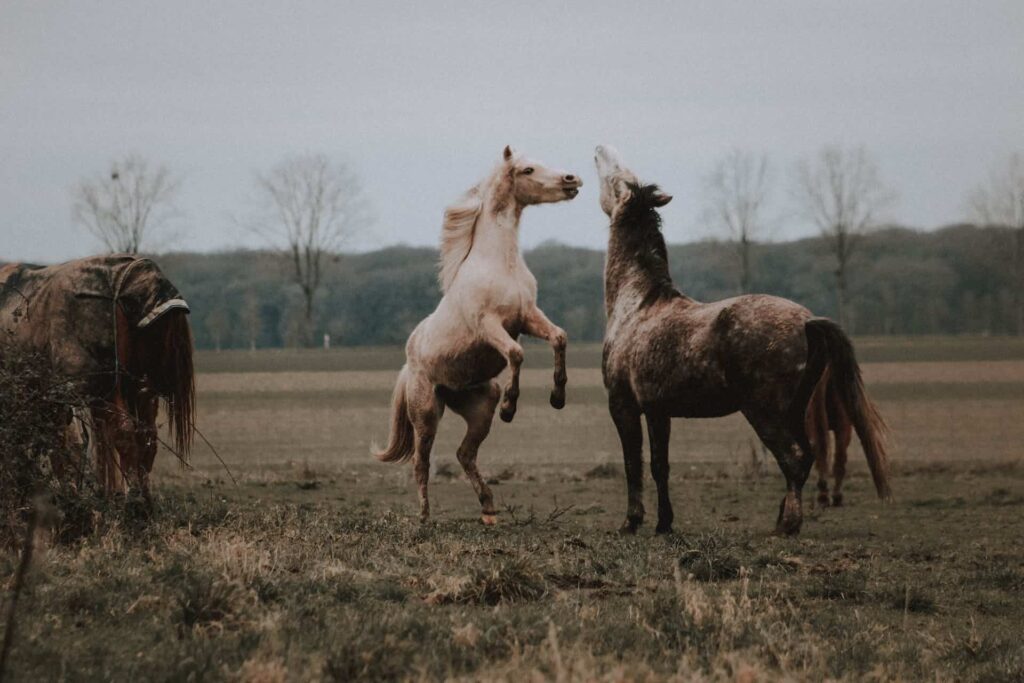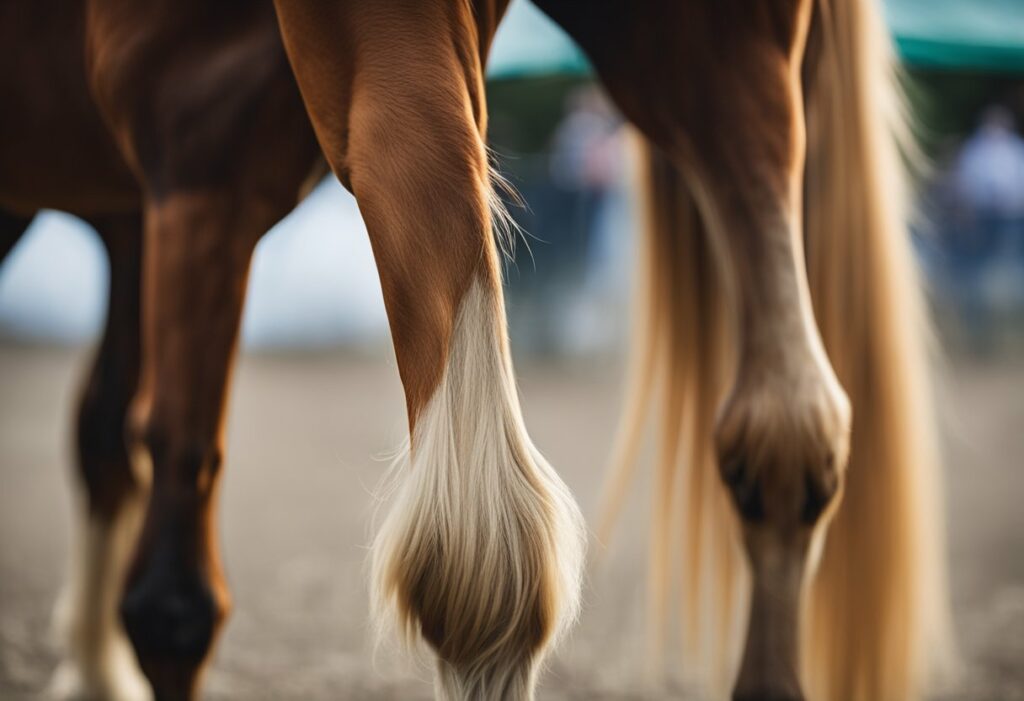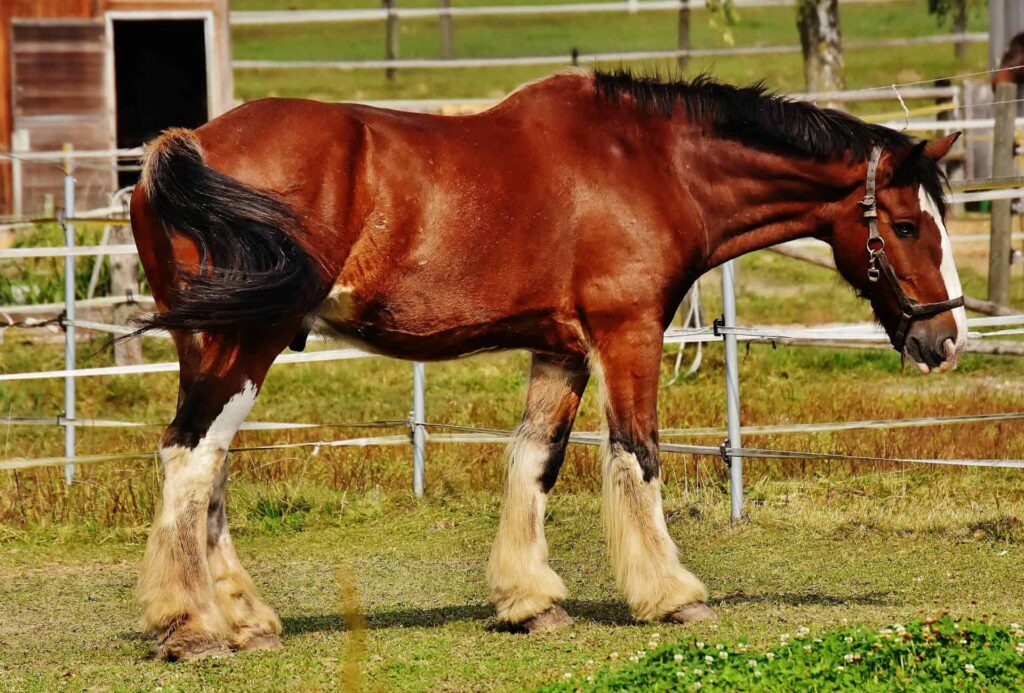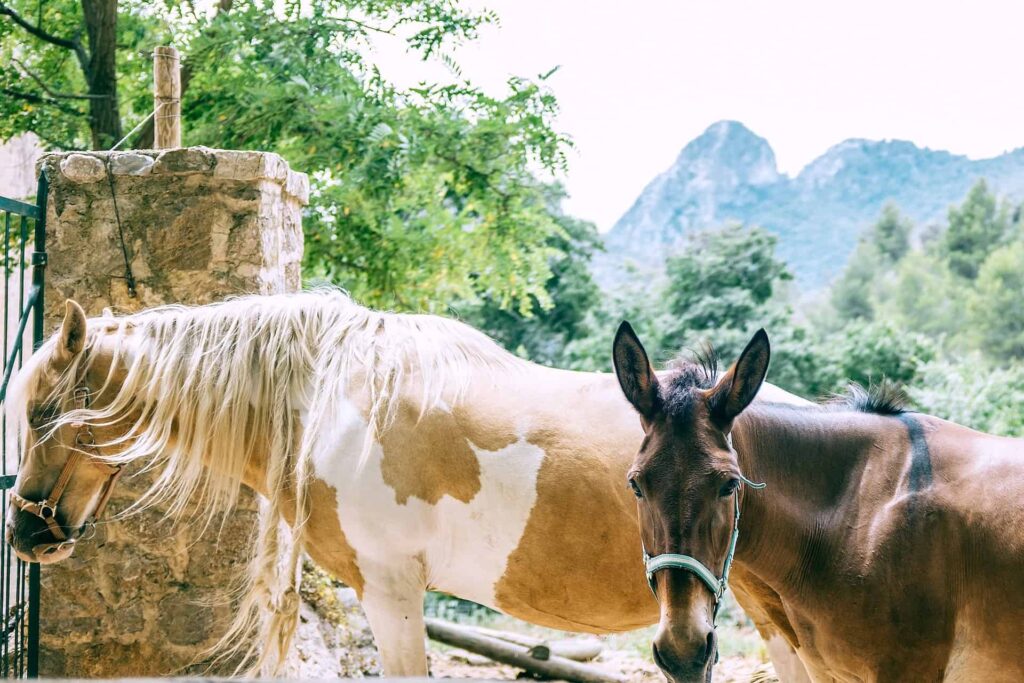Equine gelding, the process of castrating male horses, is a common procedure in the horse industry. It is primarily done to control the breeding population and reduce aggressive behaviors in male horses, allowing them to be more manageable and safer to work with. However, some horse owners might wonder whether a gelded horse can still experience penile erections, a question that could have implications for both animal welfare and the understanding of equine reproductive behavior.
A gelded horse, sometimes referred to as a “gelding,” has had his testicles removed through a surgical procedure. This removal results in a decrease in testosterone production, which in turn affects the horse’s physical and behavioral characteristics. Although it is generally expected that a gelding’s reproductive drive and ability to achieve an erection would be diminished, there have been reports of some gelded horses still engaging in certain reproductive behaviors, such as penile erection, SEAM dropping, and herding.
Research examining these behaviors among gelded and intact males suggests that variations in hormone levels, previous sexual experiences, and the individual horse’s temperament may all play a role in determining the frequency and expression of such behaviors in geldings.
Key Takeaways
- Gelding can reduce aggressive behavior in male horses, making them easier to manage
- Some gelded horses may still experience penile erections, which could be influenced by hormone levels, previous sexual experiences, and individual temperament
- Understanding the factors that contribute to reproductive behaviors in geldings can help owners make informed decisions about equine care and management
Understanding Equine Gelding
Gelding is the process in which a male horse, or stallion, is castrated to eliminate its ability to breed. This is done mainly to control the horse’s temperament, making it calmer and easier to handle. Geldings are common in several equine industries, especially in sports or riding disciplines where a more docile temperament is preferred. It’s important to understand the implications and effects of gelding on a horse’s physical and behavioral attributes.
A gelded horse, compared to a stallion, is generally more manageable and even-tempered. This is primarily due to the removal of testosterone-producing testes, which leads to a significant decrease in the hormone responsible for aggressive and sexual behaviors. It’s important to note that gelding does not entirely eliminate the presence of testosterone but reduces its levels in the horse’s body.
Geldings are known to be less aggressive and less likely to exhibit territorial or dominating behaviors, making them more compatible with other horses. They can still form social bonds and hierarchy within a herd, but usually in a less confrontational manner. This makes geldings a popular choice for riders of all levels, as they are easier to manage and train.
Can a Gelded Horse Still Get Hard
While a gelded horse would not possess the same sexual drive as a stallion, there may still be occasions where they can exhibit certain physical reactions, such as getting an erection. This can be triggered by a variety of situations, such as the presence of a mare in heat, the horse’s past experiences before being gelded, or even simple muscle contractions independent of any sexual stimulation. It is crucial to remember that this is an involuntary response and does not necessarily imply any intention or ability to breed.
Understanding the effects of gelding on a horse’s behavior and physical attributes can help in better management and care of these animals. Choosing a gelding for riding or sports activities can provide many benefits, such as a calmer temperament and fewer aggressive behaviors. Be aware of the unique characteristics and occasional physical reactions that may occur in gelded horses, while acknowledging the importance of ethical and informed decision-making in the equine world.
Understanding SEAM in Equine Behavior
SEAM in Stabled and Feral Stallions: A Broader Perspective
Recent observations and research into Spontaneous Erection and Masturbation (SEAM) in horses, both stabled and feral, suggest that these behaviors are a natural part of equine sexual expression, not merely confined to artificial or captive environments.
- Natural Sexual Behaviors Across Environments: SEAM in feral stallions, often considered to exhibit behaviors that are more ‘natural’ due to their less restricted lifestyle, indicates that these actions are intrinsic to equine behavior rather than being induced solely by domestication or confinement.
- Implications for Welfare and Management: Understanding these natural sexual behaviors is critical for improving welfare standards and management practices in both wild and domesticated horses. Recognizing SEAM as a normal part of stallion behavior, irrespective of their environment, allows for a more nuanced approach to their care and handling.
Frequency and Context of SEAM
- Varied Triggers: SEAM is not a singularly motivated behavior. Various factors, such as the horse’s immediate environment, internal stress levels, and even states of relaxation, can trigger this behavior. Identifying these triggers is essential for understanding the broader context of equine sexual behavior.
- Normalizing Natural Behaviors: By acknowledging the frequency and diverse contexts of SEAM, equine caretakers and researchers can better interpret these actions. This understanding helps in differentiating between normal behavior and potential indicators of stress or discomfort in individual horses.
Gelding Procedure and Health Aspects
Role of Castration
Castration is a surgical procedure performed on male animals, including horses, to remove their testicles. The primary goal of castration is to eliminate the production of sperm and male hormones such as testosterone, which can reduce aggressive behavior, make the animal more docile, and prevent unwanted breeding. In horses, this procedure is performed to create geldings, which are often easier to manage and train than intact males.
The Surgical Procedure
The gelding procedure can be performed using either general anesthesia or local anesthesia. General anesthesia renders the horse unconscious and immobile during surgery, while local anesthesia numbs the area to be operated on but allows the horse to remain conscious. The choice of anesthesia depends on the individual needs of the animal, the complexity of the surgery, and the preference of the veterinarian performing the procedure.
During the surgery, an incision is made in the scrotum, and the testicles are exposed. The spermatic cord, which carries blood vessels, nerves, and the vas deferens, is then clamped or tied off using sutures. This prevents bleeding and the possibility of the testicles retracting into the abdominal cavity. The testicles are then carefully removed, and the remaining portion of the spermatic cord is left to retract into the body cavity.
Post-Operative Care
After the gelding procedure, the horse requires proper postoperative care to ensure its safety and recovery. This includes monitoring for bleeding, complications, and signs of infection. Swelling at the incision site is expected, but excessive swelling may indicate a problem. Veterinarians may prescribe antibiotics and NSAIDs to manage pain and prevent infection.
Beyond medication, proper aftercare involves cleaning the surgical site and keeping the horse in a clean environment at the clinic or another appropriate location. Ensuring the horse gets gentle exercise, such as walking, helps promote circulation and healing.
Consult with a veterinarian regarding the specific aftercare instructions for a gelded horse. This will likely include vaccinations, such as a tetanus toxoid or tetanus antitoxin, to protect the horse against potential infections and diseases during the healing process.
By understanding the role of castration, the surgical procedure, and proper post-operative care, horse owners can ensure the gelding process is conducted safely and effectively, leading to a better quality of life for both the animal and its caretakers.
Castration Effects and Hormonal Analysis
The Role of Hormones Post-Castration
- Testosterone Levels: While castration significantly reduces testosterone levels, its effects on behaviors like SEAM are more complex. Some geldings continue to exhibit sexual behaviors, indicating that factors beyond just testosterone might be at play.
- Adrenal Cortex and Other Glands: The adrenal glands, among others, might contribute to the persistence or emergence of certain behaviors post-castration. Research in this area can provide deeper insights into the hormonal orchestration of equine behaviors.
Hormonal Analysis in Behavior Study
- Beyond Testosterone: Expanding studies to include a range of hormonal influences, such as cortisol levels indicating stress, or oxytocin associated with social bonding, can offer a more comprehensive understanding of equine behavior post-castration.
- Behavioral Observations: Coupling hormonal analysis with detailed behavioral observations can elucidate the nuanced ways in which hormones affect behavior. This approach is essential for developing tailored care and management strategies that cater to the physiological and psychological well-being of geldings and stallions alike.

Behavioral Implications of Gelding
Gelding is a common practice in the equine world that involves the castration of male horses, primarily to control aggressive and dominant behaviors often exhibited by stallions. The process brings about several changes in the horse’s temperament, making them generally easier to handle and train.
Stallions are known for their aggressive and territorial behaviors, mainly driven by their reproductive instincts. These behaviors can be challenging to manage, especially for inexperienced horse handlers. Gelding aims to curb these tendencies, resulting in a more docile and cooperative animal. After castration, a gelded horse may still display some stallion-like behaviors initially, but these usually subside over time, as the hormonal balance changes.
A gelded horse’s temperament is generally calmer and more predictable, making them easier to handle in various situations, from daily care to training and competitions. This has a positive impact on rider safety, as well as the horse’s contentment and quality of life.
It is important to remember that gelding does not guarantee perfect behavior in a horse. Horses are individuals with unique personalities, and while some may become more tractable through gelding, others may continue to display challenging temperaments or behavioral problems. Regular training, proper handling, and a structured environment are necessary for managing these issues.
In regards to the question of whether a gelded horse can still get hard, the answer is generally no. After castration, a gelded horse loses the ability to achieve penile erection due to the absence of testosterone and other hormones produced by the testes. There have been rare cases of gelded horses displaying erection-like behavior, likely due to some residual hormonal influence or psychological factors.
Gelding a horse can result in significant changes to their behavior and temperament, making them easier to handle and train. It does not guarantee that a horse will be free from behavioral problems, and appropriate training and management are still necessary. Castration generally prevents penile erections, although a limited number of exceptions have been observed.
Gelding and Breeding Considerations
Breeding Capability
Gelding refers to the process of castrating a male horse, usually to reduce aggressive and sexual behavior, making them more manageable and easier to handle. A gelded horse cannot impregnate a mare as its ability to produce sperm is eliminated, thereby rendering it sterile. Some gelded horses may still exhibit breeding-related behaviors.
Mounting Behavior
Mounting behavior is observed in both stallions and geldings. Although geldings are castrated, some may still display mounting behavior due to habit, lingering testosterone, or social behaviors such as dominance and playfulness. This behavior does not necessarily indicate that the gelding has the ability to impregnate a mare.
Genetic Influence
The genetic makeup of horses, including traits such as appearance, speed, temperament, and health determines their breeding value. Since geldings cannot pass on their genes, they do not contribute to the genetic diversity of the herd. In comparison, stallions with desirable traits are often selected as sires to enhance specific qualities in their offspring.
While geldings cannot sire offspring, they still bring value to their herds from a social or working perspective. Despite their inability to breed, geldings are a valuable asset to the equine community, often excelling in performance and riding disciplines due to their manageable temperament and focus on tasks.
Impact on Care and Management
Gelded horses, also known as geldings, still require attentive care and management to ensure their health and well-being. Although they may not exhibit the same level of aggression or sexual drive compared to their intact counterparts (stallions), they can occasionally get penile erections. This information is vital for horse owners because it influences the approach to handling and where the horse lives.
In terms of housing, geldings can be kept in a stall, paddock, or field, depending on their specific needs and preferences. It is important to keep the horses in an environment that promotes socialization, such as allowing them to interact with other geldings or mares. This plays a significant role in maintaining their psychological welfare and preventing issues stemming from isolation.
Muscle maintenance is also critical for a gelded horse’s overall health. Providing ample space for the horse to move around and exercise, whether in a paddock or field, will contribute to preserving its muscle tone and flexibility. Moreover, attention should be given to ensuring the horse receives adequate nutrition to support muscle health.
Recumbent horses, or those unable to stand, may require specialized care that includes support and monitoring to prevent further complications. Gelded horses in this situation need careful observation and prompt intervention to assist with standing or lying down.
Handlings of geldings should always be done with a calm and confident approach. Encouraging positive interactions during handling, such as grooming or leading, helps to build trust between the handler and the horse. Remain aware of any signs of the horse feeling uncomfortable or stressed and adjust the handling techniques accordingly.
Gelded horses, despite their altered hormonal state, necessitate attentive care and management that aligns with their unique needs and behaviors. Ensuring proper handling, housing, and nutrition are critical components in maintaining the welfare and quality of life for these equines.
Performance and Career Aspects
Gelded horses have long been known for their consistent performance and steady temperament throughout their careers. Due to the process of gelding, these horses experience a decrease in testosterone levels, which can result in a more focused and manageable demeanor during training and competitions.
Riders and trainers often choose geldings for their racing careers as they tend to exhibit greater concentration on their tasks without the distractions associated with intact male horses. The gelding process can minimize sexually driven behavior, allowing the horses to devote their energy towards their racing and training duties. Thus, improving the performance of geldings in various equestrian disciplines such as showjumping and dressage.
Despite the gelding procedure, some gelded horses can still display signs of sexual behavior. It’s important to note that this occurrence is not as common as in stallions. Geldings may exhibit these behaviors due to residual hormones or individual characteristics, but they are generally less intense and disruptive to the horse’s training and performance.
Racehorses, in particular, benefit from the gelding process as it can provide an edge in speed and stamina. Gelded horses tend to be less affected by seasonal hormonal fluctuations and more consistently engaged in their training. Riders can establish better communication with a gelded horse, as it is more cooperative and easier to manage.
Gelded horses play an important role in the equestrian world, known for their steady performance and career longevity. The gelding process positively affects their temperament, making them suitable for a wide range of disciplines, including racehorses, and provides riders and trainers with a reliable partner to work with in achieving their goals.

Additional Gelding References
Gelding, the process of castrating male horses, has various implications for a horse’s health and behavior. While geldings typically experience a decrease in male hormone-driven aggression, it’s important to consider the overall impact on their behavior and health.
In terms of behavior, gelded horses generally exhibit a more relaxed temperament compared to their intact counterparts. This can be beneficial for both pet owners and trainers, as geldings are easier to manage and more amenable to exercise routines and training regimens. The reduced aggression also lessens the risk of injury during social interactions with other animals, such as dogs. A study found that geldings are more likely to chew on objects, but that this behavior might be unrelated to their castrated status.
One aspect that must be monitored in gelded horses is their tendency to develop a swollen scrotum after surgery. Regular deworming and providing proper immunizations, such as vaccinations, aid in maintaining health. Monitor and clean any accumulating smegma, a buildup of oils, and dead skin cells that can lead to infection if not properly addressed.
Gelded horses are less likely to attract flies compared to intact stallions. This can be advantageous for both the horse and its caretakers, as fewer flies mean a more comfortable environment and reduced risk of fly-borne diseases.
In terms of exercise, geldings often display increased stamina. With decreased aggression and territorial instincts, they can focus on physical activities, making them suitable candidates for various equestrian disciplines, from dressage to trail riding.
From a scientific standpoint, gelding does seem to alter certain aspects of a horse’s physiology. For instance, a study suggests that plasma tryptophan and serotonin levels may be affected by diet in gelded horses, potentially influencing their temperaments and behavior.
Gelding horses have various effects on their health, behavior, and capabilities. Pet owners and caretakers should be aware of these changes and make necessary adjustments to ensure the well-being and happiness of their gelded horses.
Frequently Asked Questions
Why do geldings drop their sheath?
Geldings may drop their sheath for various reasons, such as to urinate, during relaxation, or due to arousal. The dropping of the sheath is normal and natural for gelded horses. It’s important to regularly check and clean the sheath to ensure the horse’s health and comfort.
How to prevent geldings from mounting mares?
To prevent geldings from mounting mares, provide adequate space and supervision for both horses. Geldings should be separated from mares, especially during feeding time or when mares are in heat. If possible, introduce geldings to a herd with a dominant male horse, which will likely discourage any unwelcomed mounting attempts.
What is riggy gelding behavior?
“Riggy” gelding behavior refers to a gelded horse exhibiting stallion-like behaviors, such as mounting mares, marking territory, or acting possessively around mares. This may be due to incomplete castration or the horse retaining some testosterone-producing tissue. In some cases, a veterinarian may need to evaluate the horse for possible further treatment.
Can a gelding exhibit possessive behavior around mares?
Yes, a gelding can exhibit possessive behavior around mares, especially if the gelding had been used as a breeding stallion before being castrated. Monitor such behaviors and intervene as necessary to ensure the safety and well-being of all horses in a herd.
Do gelded horses attempt to mate?
Although geldings are castrated and incapable of reproducing, they may still attempt to mate due to learned behaviors, retained testosterone, or simply social interactions with other horses. Their mating attempts will be non-productive, and they cannot impregnate a mare.
Is Regumate useful for controlling gelding behavior?
Regumate is a hormonal medication commonly used to control estrus cycles in mares. It is not specifically designed for controlling gelding behavior. If a gelding is exhibiting undesirable behaviors, it’s best to consult a veterinarian for advice on appropriate management and treatment options.
Last Updated on October 26, 2023 by Nate Dewsbury



